The Tokyo Tech Academy for Convergence of Materials and Informatics (TAC-MI) held its 1st International Forum in Odawara City, Kanagawa Prefecture from December 2 to 6, 2019.
During the inaugural event, students aimed to develop a broad perspective and boost their leadership skills by considering solutions to issues in future society. The objective was also to improve communication skills through group work and English presentations to a diverse audience of fellow students, academics, and industry players.
This year, 26 students — all doctoral students and a number of master's-level students affiliated with TAC-MI — participated in the event. Eight overseas doctoral students supervised by TAC-MI's international advisors were also present throughout. In total, approximately 60 participants including industrial collaborators, overseas advisors, and TAC-MI program staff members joined the final presentations and international forum.
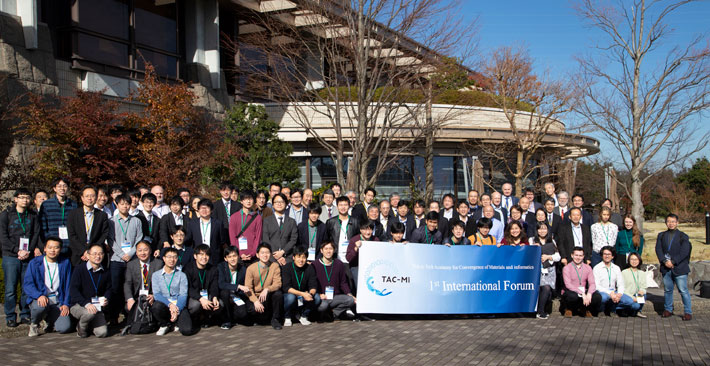
TAC-MI 1st International Forum participants
Day One: Departure ceremony
On December 2, a departure ceremony was held for participants at Tokyo Tech's Ookayama Campus. After brief opening words from TAC-MI Director Takeo Yamaguchi, TAC-MI faculty member and School of Environment and Society Professor Miki Saijo offered some initial guidance on the group work planned for the following days. The School's Associate Professor Yasunori Muromachi also gave a lecture on "Mobility Service in the Future" to provide some background to the theme of the group work session.
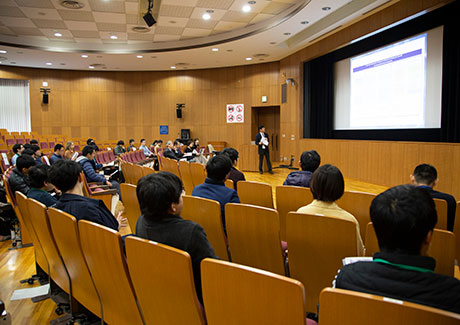
Departure ceremony
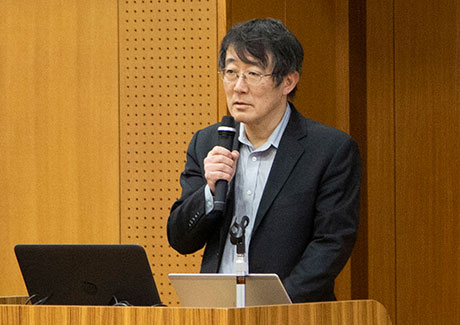
Lecture by Assoc. Prof. Muromachi
Day One: Company tour
On the afternoon of the first day, participants visited the Corporate Research & Development Center of Toshiba Corporation in Kawasaki City and the Advanced Technology Center of Nissan Motor Co., Ltd. in Atsugi City. At the former, students learned about Toshiba's wide-ranging efforts in energy and social infrastructure, including CO2 reduction, solar cells, and the development of autonomous industrial robots. During the second visit, Nissan provided a comprehensive overview of their research institute's approach to future mobility and vehicle electrification. For the students, the outings provided a welcomed break from their everyday research and set them up for the group work and business model discussions that were to follow.
Days Two and Three: Business model discussions
On Days Two and Three, the students engaged in group work and business model discussions. The aim was to develop in participants a broad perspective and business leadership while allowing them to leverage their research experience in the creation of solutions to real social issues.
The theme of the group work session was "Future sharing economy & materials and information science." Throughout the two days, students deepened their understanding of real-world problems, combined their interdisciplinary and cross-cultural knowledge to work out sustainable solutions, and finally presented these solutions.
Students began by brainstorming social issues and thinking about the people these issues affect. These ideas were shared within the group. The groups then envisioned a future where the pain of experiencing these issues is removed, and presented their ideas through posters.
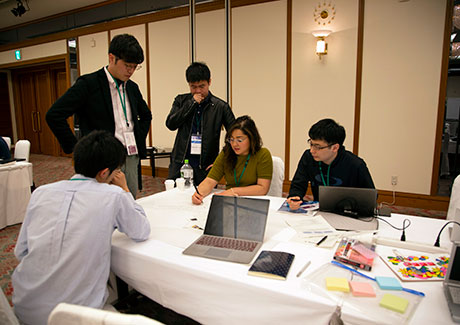
Group discussion
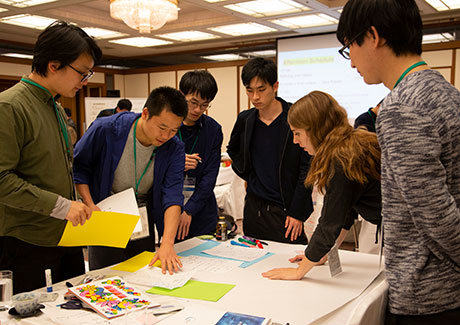
Creating posters
On the following day, groups met with Saijo and the facilitator for each group to receive advice for their final presentations.
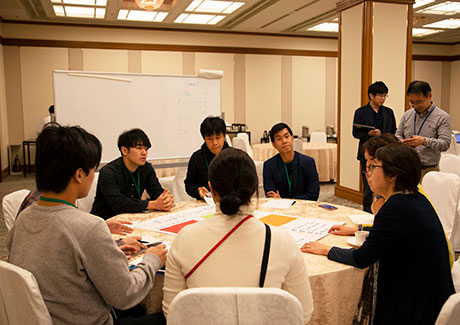
Discussions with mentor Saijo (seated far right)
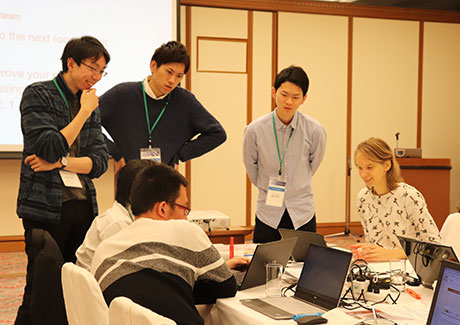
Creating slides for final presentation
The two-day discussions culminated in final presentations given to roughly 60 people including overseas advisors, industrial collaborators, and TAC-MI program staff members. After listening to the presentations of all six groups, judges awarded the Best Teamwork Award and Best Presenter Award to outstanding performers, and the Best Solution Award to the overall group winner.
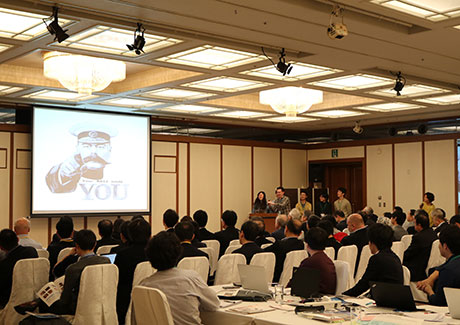
Final presentation of group work
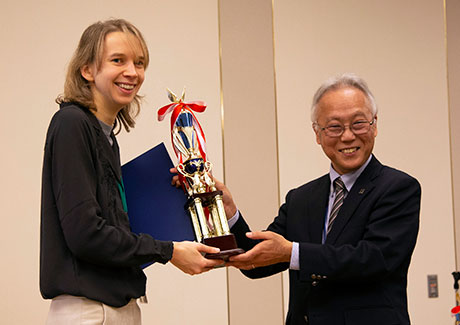
Best Presenter Award Winner Pauline van Deursen (left)
and Tokyo Tech EVP for Education Tetsuya Mizumoto
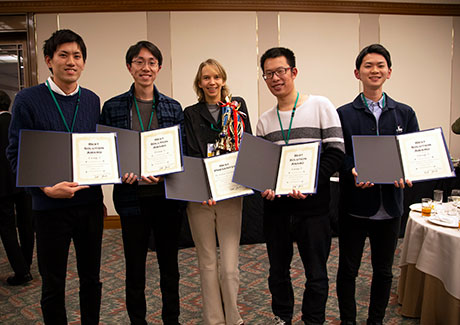
Group 3: Best Solution Award
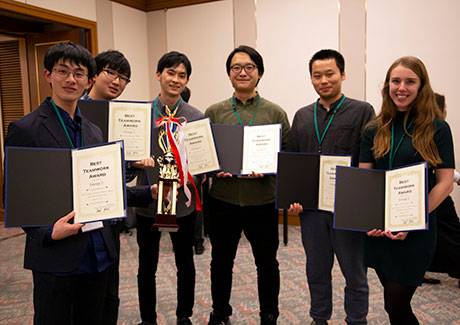
Group 2: Best Teamwork Award
International Forum: Lectures by overseas advisors
On the morning of the fourth day, world-leading researchers who cooperate with TAC-MI provided lectures and introduced some of their recent research findings.
Speaker |
Lecture title |
Prof. J. M. van Ruitenbeek
Leiden University, Netherlands |
Advances and challenges in single-molecule electron transport (via Skype) |
Prof. Hans-Jürgen Butt
Max Planck Institute, Germany |
Materials for low contact angle hysteresis |
Prof. Peter Grutter
McGill University, Canada |
Ultrafast time and nm spatial resolution of materials for energy sustainability by atomic force microscopy |
Prof. Sergei Kazarian
Imperial College London, UK |
Emerging applications of spectroscopic imaging to polymers, biomaterials and dynamic systems |
Prof. Christopher Kemper Ober
Cornell University, USA |
Ionic-electronic conductivity in liquid crystalline materials– A computational /experimental study |
Prof. Xie Xu-Ming
Tsinghua University, China |
Super tough hydrogels created by Multi-bond Network (MBN) strategy |
Prof. Christel Laberty-Robert
Sorbonne University, France |
Battery and perspective (via Skype) |
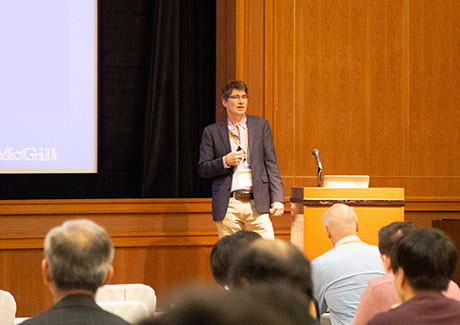
Lecture by overseas advisor Prof. Peter Grutter
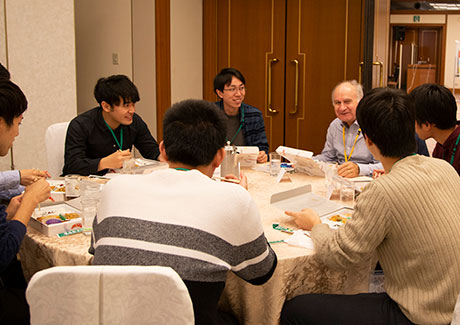
Interview with overseas advisor Prof. Sergei Kazarian
These researchers also participate as overseas advisors in TAC-MI's international mentoring system, which aims to pinpoint the strengths and weaknesses of each student through interviews. Five overseas advisors participating in this international forum met with TAC-MI students on December 4 and 6, offering advice and encouragement regarding the students' research presentations.
International Forum: Student presentations
On the afternoon of December 5 and the morning of December 6, ten of TAC-MI's 1st-year doctoral students and eight overseas doctoral students provided presentations to the audience. Program staff members from Tokyo Tech and industry evaluated the presentations and Q&A sessions from the following four perspectives:
- 1.
- Specialized / Basic knowledge
- 2.
- Leadership: Presentation skills, communication skills
- 3.
- Problem-solving ability
- 4.
- Professional quality of knowledge
This research presentation was also part of the Qualifying Examination, a critical checkpoint in the TAC-MI curriculum. Participating students confidently presented the significance and achievements of their research so far, and after the presentation, actively engaged in Q&A sessions with the audience. At the closing ceremony on December 6, the Best Presentation Award was awarded to the most highly evaluated TAC-MI student and overseas student.
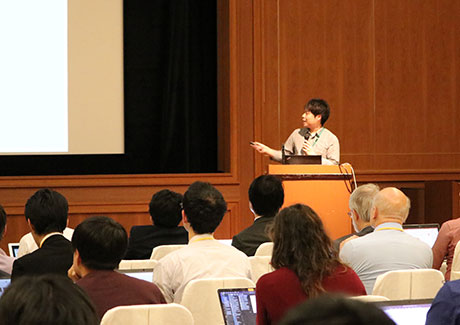
Research presentation by doctoral student
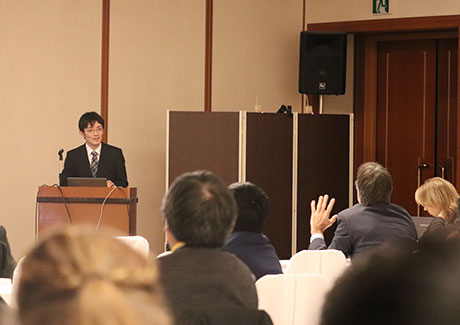
Q&A session after presentation
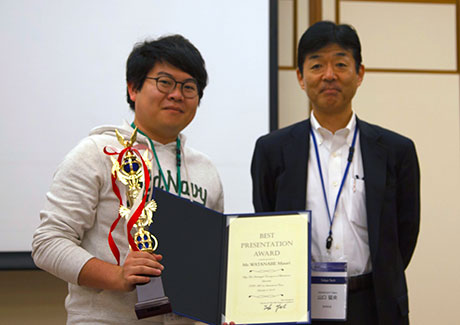
Best Presentation Award Winner Masari Watanabe (left)
and TAC-MI Director Yamaguchi
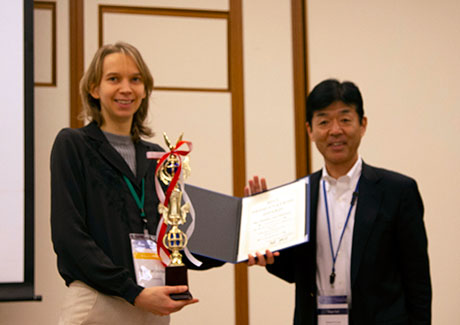
Best Presentation Award Winner
Pauline van Deursen (left) and Yamaguchi
Interview with industrial mentors
During the International Forum, TAC-MI students also met with their industrial mentors. Throughout the duration of this program, each student has one industrial mentor who continuously monitors the student from enrollment to program completion. Through interviews, students not only grasp their own strengths and weaknesses, but also receive advice on research, presentations, and career paths.
The TAC-MI 1st International Forum was a valuable experience in promoting new collaborative education involving industry and academia. The five-day event not only offered students the opportunity to deepen exchanges through intensive group work, business discussions, and shared free time, but also opened up new perspectives to Tokyo Tech faculty members, overseas advisors, and industrial collaborators.
Going forward, the TAC-MI International Forum will be held once a year.
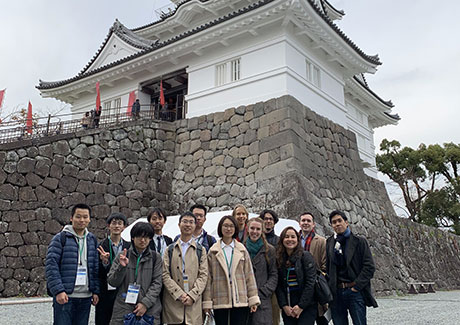
Sightseeing near Odawara Castle
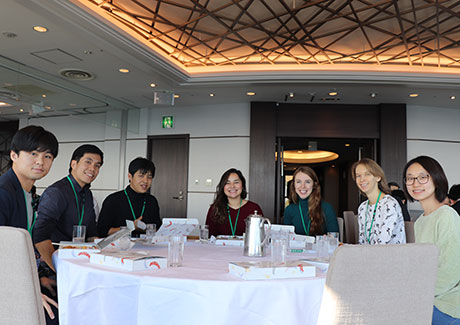
Lunch with overseas students
Tokyo Tech Academy for Convergence of Materials and Informatics (TAC-MI)
TAC-MI, established in January 2019 under the auspices of the Doctoral Program for World-leading Innovative & Smart Education (WISE) of the Ministry of Education, Culture, Sports, Science and Technology, aims to cultivate multi-talented individuals who can play a leading role in creating new industries and academic fields involving materials science, information science, and social services. The program also places strong emphasis on working closely with industry.
. Any information published on this site will be valid in relation to Science Tokyo.





















